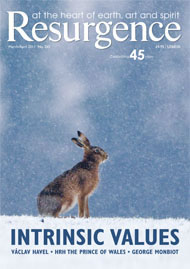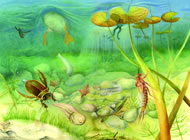If you want to look into a pond, you don’t whack it with a stick. Don’t chuck a rock or jump in it either. Leave it be: ponds are best left alone – they’re quiet, secluded little places having sensitive atmospheres. But, if you must look into one, right into one; if you have the ability to see, really to see, prepare for an alien odyssey.
Pick a nice sunny day to visit a pond. Settle down quietly beside it. The first thing you will notice is its calm – there appears to be nothing going on. Your presence has already had impact. The observer has affected the experiment. The best thing you can do is go away and leave it be, which is why ponds are best left alone. If you must persist, stubbornly, you’ll need to exercise patience. The creatures that live there will have clocked you before you arrived and they will be keeping pretty still.
On your first sitting at your pond you might think you have come to a barren little ocean, even though it is surrounded by alder, goat withy, ragged robin, enchanter’s nightshade, water dropwort, kingcups, veronica, cress, algae, flag iris, reeds, sedges, horsetails and hart’s tongue – all threaded about with dragonflies, damselflies, bees, wasps, hoverflies, midges, commas, red admirals, painted ladies and, by night, bats.
Down in the sticky plenty of the warm underworld beneath this fluttering canopy, scurrying along in the root thatch will be voles and devil’s coach-horse beetles, iridescent blues, mayfly larvae, grasshoppers, spiders, tadpoles and toadlets – all this and you haven’t even looked into the water yet.
At last you peer down. The first things you see are reflections. Reflections of the blue above, clouds, overhanging branches, inverted birds flying across the flat face of the dark crystal you are scrying, shuddering to every single little emanation that reverberates across its polished skin. It is a mirror. You cannot see through this mirror until you adjust your perspective and lean a little closer.
Bending to the water, you are presented with a shocking image. A battered, ghoulish face looms eerily out of the darkness, its hollow orbs staring you straight in the eyes. With a gasp of horror you reel back. What trick is this that you came to look into a pool only to find yourself gazing upon yourself, haloed like the Green Man with overhanging trees and iris leaves? Ah, this little pond is an enigma. You study your reflection like an alchemist peering into a still – and who should come walking across the water but a pond skater? You marvel at the indents his pointy little toes make upon the meniscus as he skates from shore to shore, narrowly avoiding the fragile cobweb of the big tiger spider crouched in the dry reed, tweaking the tripwire that separates the innocent dancer from his silvery world and the jaws of an arachnid eternity.
As you lean closer to the water, you can smell it: its bitter-sweet aroma, its moulds and green slimes, its ever-evolving state of flux as it bubbles and digests, recycles, composts and decays, transforming death into life amongst its duckweed. As your eyes accustom to the gloom, something wonderful happens. Slowly, like a veil being moved across a starlit window, this little pool reveals her cosmic treasures.
Jigging, wriggling, swimming, gliding, floating in their altered gravitational state are many millions of dipping, diving, swiftly and slowly moving alien craft of sensational design, outlandish enough to make any science-fiction monster-maker ashamed of his art. Water boatmen, mayfly nymphs, phantom midge larvae, dragonfly larvae and water scorpions chug and weave through this miniature viscid galaxy. Here a newt is suspended weightlessly like a giant spaceship in the floating arms of its spirogyral galaxy, while deep on the swampy floor beneath lies a carpet of twigs, acorns, beech mast and leaves in various stages of decomposition, tapestried in bewildering technicolour, home to water snails, sandhoppers, minnows and millions and millions of tiny little bacteria: plankton of the freshwater shallows, their huge numbers providing the steadying hand of balance in this fantastic little liquid universe, which you, like a god, have had the great, good privilege to behold, and it steals your breath away.
Bewildered by its cohesion and symmetry, its unity and composition, you become aware that every single thing in this pool – from the simplest bacterium to the foxes that come to drink – all that inhabit or visit it are affected by it as it is by them. Each depends one upon the other, upon everything in and around it. Nothing is out of place. Every creature, however tiny or seemingly insignificant, has reason to be there. As you allow your eyes to penetrate the mysteries of this symbiotic, sliding world, you find yourself subtly sensing that as you are watching it, it is watching you.
In the duckweed, not three feet from your head, a bright little pair of amphibian eyes watch you. Mysteriously, like an estuarine alligator they sink soundlessly beneath the surface with barely a ripple. Others rise in different places and, they too, watch you. More appear: green eyes, yellow eyes, brown eyes, black eyes. Soon you find you are being watched not only by them but by other eyes as well. You did not spot her at first but now you see: there in the reed is a moorhen, on a nest. With her sharp avian eye she has been watching you all the time. As have the birds above your head, and who knows who has been watching you from the depths of the pool or from the grass in which you are lying?
They have all seen you. How many of them have you noticed? More people know Tom Fool than Tom Fool knows. A sense of calm pervades. All is still. Now you spot the spoor marks of the badger in the mud. A weasel, not three yards away, stands to sniff the air. He drops to his feet and lopes through the grass, a golden-brown little blur in his white tie. What a miracle he is. What a miracle it all is. You didn’t need to whack this little aquatic ark with a stick. All you had to do was sit there and wait for her to reveal herself, in her own time, of her own accord.
You can lie back and sleep in the sun, in the silence of the pool, knowing that you and she are all part of the same thing, fashioned in different ways, but made of the same stuff, while all the crazy little inhabitants living out their exotic, busy little lives in her metaphorical cosmic embrace are your ancestral grandfathers and grandmothers, uncles and aunts.








